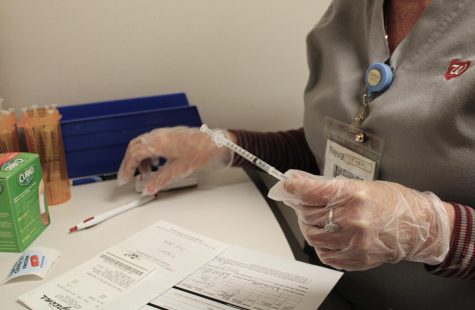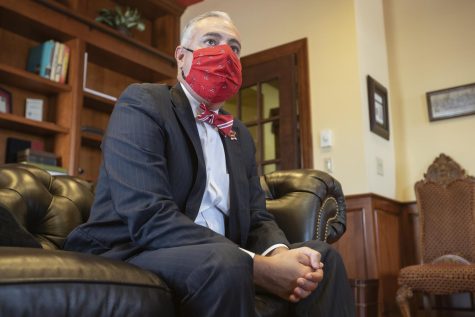Board of Regents discuss coronavirus and retention, approve salary increase for Caboni
March 6, 2020
The Board of Regents met for the first quarterly meeting of the year on March 6, and discussed issues such as the coronavirus, recruitment and retention and approved a salary increase for WKU President Timothy Caboni.
Caboni and Provost Cheryl Stevens reported on how WKU is responding to a potential outbreak of COVID-19.
“The best thing everyone can do right now is to wash your hands, not touch your face and if you feel sick, please stay home,” Caboni said. “If we do those three things, we have a little bit more time to prepare, but preparation is exactly what we’ve been doing.”
Stevens said 30 faculty members attended a live webinar was created by the WKU Center for Innovative Teaching and Learning. CITL provided the attendees with information about how they can teach their class when they can not meet in person.
“I think the important idea is it doesn’t have to look the way it did in the syllabus,” Stevens said. “The idea is that they deliver the class in such a way that students get a good experience.”
Stevens also said she would make sure students are not penalized if they are sick during the potential COVID-19 outbreak. Caboni said it’s important for the faculty and staff to work as a community and become flexible if the virus impacts WKU.
The Board of Regents also approved a $22,500 salary increase for Caboni – enough to offset a tax liability the IRS says he must pay on the value he gets from living in the WKU’s owned presidential residence on Chestnut Street. The increase was previously discussed at the last committee meeting in January.
At that meeting, regents said they were obligated to pay Caboni under his contract with the university for the taxes he must pay for the benefit of a free home with paid utilities.
Caboni’s base salary is $400,000, according to his initial employment contract.
Jace Lux, director of Recruitment and Admissions, discussed changes to recruitment and retention of students. He said WKU has admitted 154 more students this year than last year and 399 more students this year have registered for the Topper Orientation Program than last year.
“If a student registers for orientation, there’s about an 85% chance that he or she will actually show up to orientation,” Lux said. “If they show up to orientation, there’s about a 92% chance that that student will come to WKU in the fall.”
Lux said growth in student recruitment has primarily been students from Kentucky, particularly from Warren County.
Among the students that are admitted to WKU but chose not to enroll, 52% of them do not attend any college, Lux said.
“That’s really caused us over the past year and a half to back up our messaging and not start the conversation with all the reasons you should come to WKU, but really start that conversation with ‘here’s why college matters,’” Lux said.
Caboni said the growth in student recruitment is encouraging, but he is not impressed by a decline in international student enrollment. WKU once had about 1,400 international students enrolled, but now has about 300.
“We’re continuing to build relationships, form relationships, deepen relationships internationally, but it is a market where we’re having to be cautious,” Caboni said. “If you ask me where the growth potential is, I would argue [that] internationals [are] probably not the place to look for massive growth today.”
Renovation of the Health Sciences Complex was brought up by Tania Basta, dean of the College of Health and Human Services. She spoke in front of the board requesting that three rooms in the Health Sciences Complex used to teach nursing students be renovated into two larger spaces.
“Currently we have our classes split between two classrooms with the instructor in one room being [telecasted] to the other classroom, so half of our students are seeing an instructor on the screen,” Basta said. “Apparently that’s not okay for accreditation and could put us at risk [of losing it].”
Basta offered other solutions including hiring more faculty and lowering the number of students admitted into the program, but claimed remodeling would be less expensive and allow the program to maintain its current cohort size.
The Board of Regents will gather April 17 for a committee meeting and the next quarterly meeting is set for May 15.
Reporter Leo Bertucci can be reached at [email protected]




















